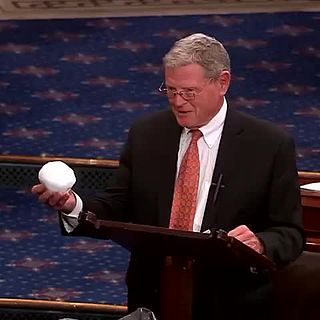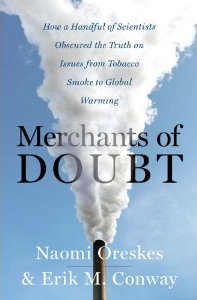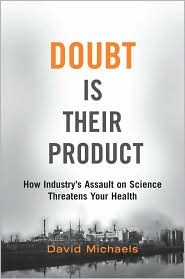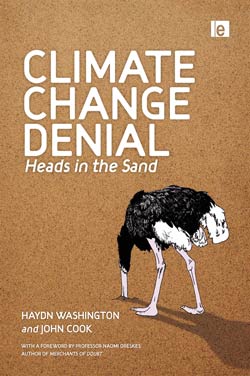Related Research Articles
Junk science is spurious or fraudulent scientific data, research, or analysis. The concept is often invoked in political and legal contexts where facts and scientific results have a great amount of weight in making a determination. It usually conveys a pejorative connotation that the research has been untowardly driven by political, ideological, financial, or otherwise unscientific motives.
The Heidelberg Appeal, authored by Michel Salomon, was an appeal directed against the findings of the Intergovernmental Panel on Climate Change. The Heidelberg Appeal's goal was similar to the later published Leipzig Declaration. Before the publication, Fred Singer, who has initiated several petitions like the Heidelberg Appeal, and Michel Salomon, had organized a conference in Heidelberg, which led to that document. It was published on the last day of the 1992 Rio Summit, and warned against basing environmental policies on what the authors described as "pseudoscientific arguments or false and nonrelevant data." It was initiated by the tobacco and asbestos industries, to support the climate-denying Global Climate Coalition. According to SourceWatch the appeal was "a scam perpetrated by the asbestos and tobacco industries in support of the Global Climate Coalition". Both industries had no direct reason to deny global warming, but rather wanted to promote their "sound science" agenda, which basically states that industry-funded science is good science and science contradicting those science is bad science or "junk science".
The politicization of science for political gain occurs when government, business, or advocacy groups use legal or economic pressure to influence the findings of scientific research or the way it is disseminated, reported or interpreted. The politicization of science may also negatively affect academic and scientific freedom, and as a result it is considered taboo to mix politics with science. Historically, groups have conducted various campaigns to promote their interests in defiance of scientific consensus, and in an effort to manipulate public policy.
In United States federal law, the Daubert standard is a rule of evidence regarding the admissibility of expert witness testimony. A party may raise a Daubert motion, a special motion in limine raised before or during trial, to exclude the presentation of unqualified evidence to the jury. The Daubert trilogy are the three United States Supreme Court cases that articulated the Daubert standard:
The Advancement of Sound Science Center (TASSC), formerly The Advancement of Sound Science Coalition, was an industry-funded lobby group and crisis management vehicle, and was created in 1993 by Phillip Morris and APCO in response to a 1992 United States Environmental Protection Agency (EPA) report which identified secondhand smoke as a "confirmed" human carcinogen. TASSC's stated objectives were to (1) discredit the EPA report; (2) fight anti-smoking legislation; and (3) pro-actively pass legislation favourable to the tobacco industry.

In the psychology of human behavior, denialism is a person's choice to deny reality as a way to avoid believing in a psychologically uncomfortable truth. Denialism is an essentially irrational action that withholds the validation of a historical experience or event when a person refuses to accept an empirically verifiable reality.

Climate change denial is a form of science denial characterized by rejecting, refusing to acknowledge, disputing, or fighting the scientific consensus on climate change. Those promoting denial commonly use rhetorical tactics to give the appearance of a scientific controversy where there is none. Climate change denial includes unreasonable doubts about the extent to which climate change is caused by humans, its effects on nature and human society, and the potential of adaptation to global warming by human actions. To a lesser extent, climate change denial can also be implicit when people accept the science but fail to reconcile it with their belief or action. Several studies have analyzed these positions as forms of denialism, pseudoscience, or propaganda.
The Weinberg Group is a Washington, DC-based food and drug regulatory consulting group. Founded in 1983, the firm assists pharmaceutical and biotech companies with the "development and implementation of successful and innovative regulatory strategies" and also helps these companies to "remediate, maintain and improve their regulatory compliance." The Weinberg Group sent a memo to DuPont in 2003 recommending that the company “reshape the debate by identifying the likely known health benefits of PFOA exposure.”

A Frank Statement to Cigarette Smokers was a historic first advertisement in a campaign run by major American tobacco companies on January 4, 1954, to create doubt by disputing recent scientific studies linking smoking cigarettes to lung cancer and other dangerous health effects.
Fear, uncertainty, and doubt (FUD) is a manipulative propaganda tactic used in sales, marketing, public relations, politics, polling, and cults. FUD is generally a strategy to influence perception by disseminating negative and dubious or false information, and is a manifestation of the appeal to fear.

Merchants of Doubt: How a Handful of Scientists Obscured the Truth on Issues from Tobacco Smoke to Global Warming is a 2010 non-fiction book by American historians of science Naomi Oreskes and Erik M. Conway. It identifies parallels between the global warming controversy and earlier controversies over tobacco smoking, acid rain, DDT, and the hole in the ozone layer. Oreskes and Conway write that in each case "keeping the controversy alive" by spreading doubt and confusion after a scientific consensus had been reached was the basic strategy of those opposing action. In particular, they show that Fred Seitz, Fred Singer, and a few other contrarian scientists joined forces with conservative think tanks and private corporations to challenge the scientific consensus on many contemporary issues.

Doubt is Their Product: How Industry's Assault on Science Threatens Your Health is a 2008 book by David Michaels, an epidemiologist and Professor in the Departments of Environmental and Occupational Health and Epidemiology at the Milken Institute School of Public Health of the George Washington University. Michaels served as Assistant Secretary of Labor for Occupational Safety and Health under U.S. President Barack Obama.

Yandell Henderson was an American physiologist. The New York Times called him an "expert on gases" and "an authority on the physiology of respiration and circulation and on pharmacology and toxicology of gases". He was also noted for new methods in resuscitation. Henderson was a director of the Yale Laboratory of Applied Physiology at Yale University, a member of the National Academy of Sciences, chairman of the section of physiology and pathology of the American Medical Association. He was also a member of the American Philosophical Society. A collection of his papers are held at the National Library of Medicine in Bethesda, Maryland.

Merchants of Doubt is a 2014 American documentary film directed by Robert Kenner and inspired by the 2010 book of the same name by Naomi Oreskes and Erik M. Conway. The film traces the use of public relations tactics that were originally developed by the tobacco industry to protect their business from research indicating health risks from smoking. The most prominent of these tactics is the cultivation of scientists and others who successfully cast doubt on scientific results. Using a professional magician, the film explores the analogy between these tactics and the methods used by magicians to distract their audiences from observing how illusions are performed. For the tobacco industry, the tactics successfully delayed government regulation until long after the establishment of scientific consensus about the health risks from smoking. As its second example, the film describes how manufacturers of flame retardants worked to protect their sales after toxic effects of the retardants were reported in the scientific literature. The central concern of the film is the ongoing use of these tactics to forestall governmental action to regulate greenhouse gas emissions in response to the risks of global climate change.
The Center for Indoor Air Research was a tobacco industry front group established by three American tobacco companies—Philip Morris, R.J. Reynolds, and Lorillard—in Linthicum, Maryland, in 1988. The organization funded research on indoor air pollution, some of which pertained to passive smoking and some of which did not. It also funded research pertaining to causes of lung cancer other than passive smoking, such as diet. The organization disbanded in 1998 as a result of the Tobacco Master Settlement Agreement.

Climate Change Denial: Heads in the Sand is a 2011 non-fiction book about climate-change denial, coauthored by Haydn Washington and John Cook, with a foreword by Naomi Oreskes. Washington had a background in environmental science prior to authoring the work; Cook, educated in physics, founded (2007) the website Skeptical Science, which compiles peer-reviewed evidence of global warming. The book was first published in hardcover and paperback formats in 2011 by Earthscan, a division of Routledge.
Scientific dissent is dissent from scientific consensus. Disagreements can be useful for finding problems in underlying assumptions, methodologies, and reasoning, as well as for generating and testing new ways of tackling the unknown. In modern times, with the increased role of science on the society and the politicization of science, a new aspect gained prominence: effects of scientific dissent on public policies.

The tobacco industry playbook, tobacco strategy or simply disinformation playbook describes a strategy devised by the tobacco industry in the 1950s to protect revenues in the face of mounting evidence of links between tobacco smoke and serious illnesses, primarily cancer. Much of the playbook is known from industry documents made public by whistleblowers or as a result of the Tobacco Master Settlement Agreement. These documents are now curated by the UCSF Truth Tobacco Industry Documents project and are a primary source for much commentary on both the tobacco playbook and its similarities to the tactics used by other industries, notably the fossil fuel industry. It is possible that the playbook may even have originated with the oil industry.
Disinformation attacks are strategic deception campaigns involving media manipulation and internet manipulation, to disseminate misleading information, aiming to confuse, paralyze, and polarize an audience. Disinformation can be considered an attack when it occurs as an adversarial narrative campaign that weaponizes multiple rhetorical strategies and forms of knowing—including not only falsehoods but also truths, half-truths, and value-laden judgements—to exploit and amplify identity-driven controversies. Disinformation attacks use media manipulation to target broadcast media like state-sponsored TV channels and radios. Due to the increasing use of internet manipulation on social media, they can be considered a cyber threat. Digital tools such as bots, algorithms, and AI technology, along with human agents including influencers, spread and amplify disinformation to micro-target populations on online platforms like Instagram, Twitter, Google, Facebook, and YouTube.
Richard A. Daynard is an American legal scholar. He is a University Distinguished Professor at the Northeastern University School of Law.
References
- ↑ Manufactroversy: "A contrived or non-existent controversy, manufactured by political ideologues or interest groups who use deception and specious arguments to make their case", Paul McFedries, Wordspy.com, December 16, 2009
- 1 2 3 4 Ceccarelli, Leah (April 11, 2008). "Manufactroversy: The Art of Creating Controversy Where None Existed". Science Progress . Center for American Progress. Archived from the original on August 21, 2019.
- 1 2 3 Michaels D (2005). "Scientific evidence and public policy". Am J Public Health. 95 (Suppl 1): S5–7. doi:10.2105/AJPH.2005.065599. hdl: 10.2105/AJPH.2005.065599 . PMID 16030339.
- 1 2 3 4 5 Attie, A. D. (2006). "The Republican war on science". Journal of Clinical Investigation . 116 (3): 552. doi:10.1172/JCI28068. PMC 1386128 .
- 1 2 3 4 Michaels D, Monforton C (2005). "Manufacturing uncertainty: contested science and the protection of the public's health and environment". Am J Public Health. 95 (Suppl 1): S39–48. CiteSeerX 10.1.1.620.6171 . doi:10.2105/AJPH.2004.043059. PMID 16030337.
- ↑ "The Paranoid Style in American Science: 3. Contrary Imaginations", Daniel Engber, Slate , April 17, 2008
- ↑ "The Paranoid Style in American Science: 2. An Uncertain Truth", Daniel Engber, Slate , April 16, 2008
- ↑ Camargo KR (December 2009). "Public health and the knowledge industry". Rev Saude Publica. 43 (6): 1078–283. doi: 10.1590/S0034-89102009005000076 . PMID 20027493.
- 1 2 Michaels D, Monforton C, Lurie P (2006). "Selected science: an industry campaign to undermine an OSHA hexavalent chromium standard". Environ Health. 5 (1): 5. Bibcode:2006EnvHe...5....5M. doi: 10.1186/1476-069X-5-5 . PMC 1402271 . PMID 16504102.
- ↑ Holthouse, David (Summer 2008). "State of Denial Turkey Spends Millions to Cover Up Armenian Genocide. Intelligence Report" (130).
{{cite journal}}: Cite journal requires|journal=(help) - ↑ Mamigonian, Marc A. (2015). "Academic Denial of the Armenian Genocide in American Scholarship: Denialism as Manufactured Controversy". Genocide Studies International. 9 (1): 61–82. doi:10.3138/gsi.9.1.04. S2CID 154623321.
- ↑ Manufacturing Controversy : Left-Wing Denial of the Rwandan Genocide. Routledge. August 13, 2023. doi:10.4324/9781351295000-5. ISBN 978-1-351-29500-0.
- ↑ Hall, Harriet (June 3, 2009). "Vaccines & Autism: A Deadly Manufactroversy". Skeptic Magazine . 15 (2).